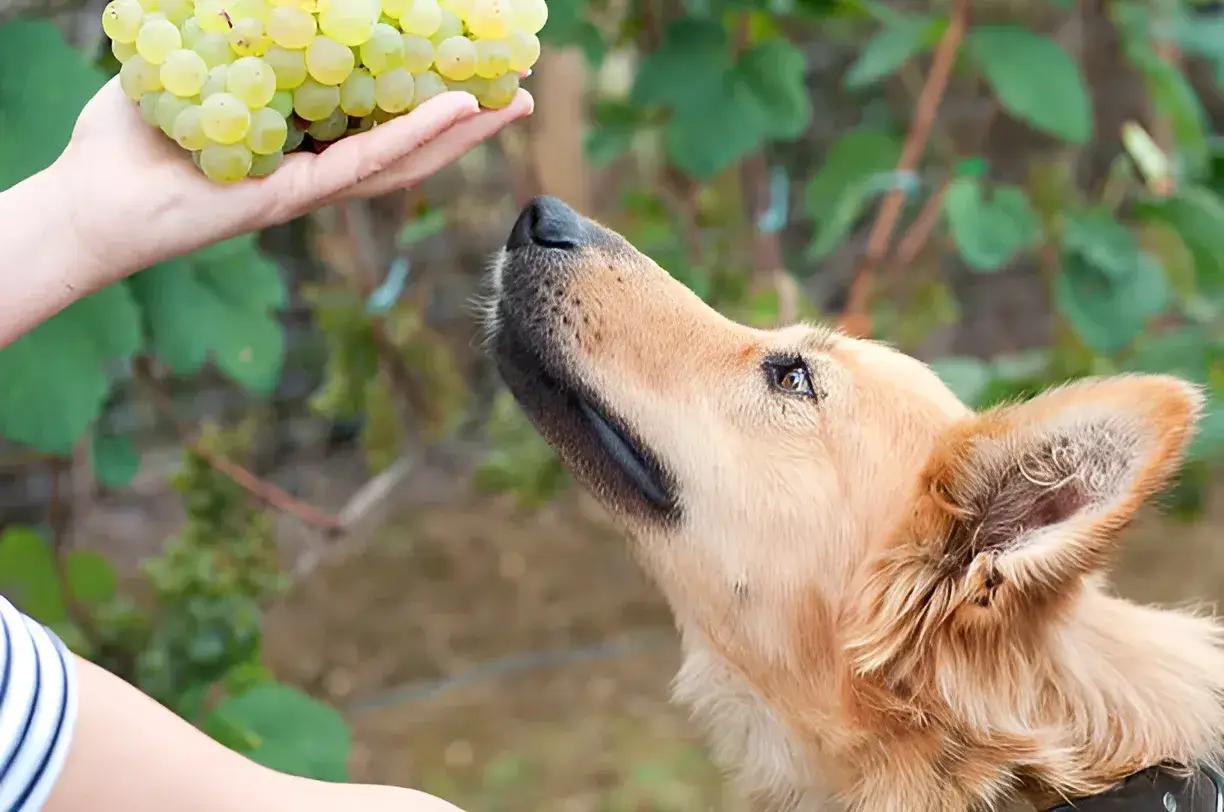Yes, grapes and raisins are extremely toxic to dogs and can lead to fatal kidney failure. Even a small amount can have devastating consequences. It’s essential for all dog owners to understand the dangers and how to act fast in an emergency.
Why Grapes Are Deadly for Dogs
While the precise toxin remains a mystery, scientists suspect that it’s related to how dogs metabolize the sugars and other compounds found in grapes and raisins. Sadly, not all dogs react the same way. Some dogs may have mild symptoms while others experience devastating kidney failure.
Warning Signs of Grape Poisoning
- Vomiting and diarrhea (often within a few hours)
- Loss of appetite
- Weakness and lethargy
- Excessive thirst
- Decreased or no urine production
- Abdominal pain
- Dehydration
What to Do If Your Dog Eats Grapes
Seek Emergency Care: Don’t delay—contact your veterinarian or an emergency animal hospital immediately. Explain the situation and follow their instructions.
Potential for Induced Vomiting: If the ingestion was recent, your vet may recommend inducing vomiting to remove grapes from your dog’s system. Do NOT do this unless specifically advised by a veterinarian.
Hospitalization and Treatment: Depending on the severity, the vet may hospitalize your dog for intensive care. This could include intravenous fluids, medication to protect the kidneys, and close monitoring of their condition.
Prevention is Key

Keeping grapes and raisins out of reach is crucial, but vigilance goes beyond the kitchen. Here are some hidden sources of grape danger to be aware of:
Store grapes out of reach: Keep grapes, raisins, and foods and products containing them far away from your dog.
Trail mix: This seemingly harmless snack can contain raisins or dried cranberries, both toxic to dogs.
Baked goods (muffins, cookies): These treats often incorporate grapes or raisins, making them off-limits for canine companions.
Fruit salads: Be mindful of fruit salads containing grapes or raisins, and keep them out of your dog’s reach.
Kids dropping food: Children sometimes drop grapes or raisins on the floor. Supervise playtime and walks to prevent your dog from snatching up these forbidden treats.
Educate everyone: Ensure all family members and visitors understand the danger.
Avoid table scraps: Supervise your dog closely during mealtimes.
Understanding the Risks
Every grape is a risk: There is no way to determine a “safe” amount of grapes or raisins for dogs. Even a single grape can lead to severe health consequences for some.
Individual differences: Each dog may react differently to grape toxicity based on factors like breed, size, and pre-existing health conditions. Smaller dogs and those with kidney problems are at heightened risk.
The danger isn’t always immediate: While initial symptoms like vomiting may appear within hours, the serious signs of kidney failure can take several days to develop.
How Much Is Too Much?
You might be wondering, “If just one grape or raisin won’t hurt, how much is truly dangerous?” The unfortunate truth is that there is no known safe amount of grapes or raisins for dogs. While some dogs may seem unaffected after a small amount, the risk of kidney failure is always present.
Veterinary studies have documented cases of severe reactions following the ingestion of as few as three grapes. The risk also varies depending on the dog’s size and overall health. A smaller dog or a dog with pre-existing kidney issues is more susceptible to serious complications. When it comes to grapes and raisins, it’s always best to err on the side of caution and avoid them altogether.
Xylitol Danger
A double threat exists for some grape-containing foods. Xylitol, a sugar substitute sometimes used in baked goods and sugar-free products, is highly toxic to dogs. If you see raisins or grapes listed as ingredients on a product label, double-check for xylitol as well.
Conclusion
The risk of grape toxicity is not worth even a single grape. By understanding the dangers, staying vigilant, and acting quickly in an emergency, you can help keep your beloved furry companion safe.
The photo featured below the post headline is Credit: Irantzu_Arbaizagoitia/istockphoto
I hope you find this post helpful and informative. If Yes’ feel free to share it with your friends!
Frequently Asked Question
Are all types of grapes dangerous?
Yes, all types of grapes (red, green, seeded, seedless, organic, etc.) as well as raisins, currants, and foods containing them are toxic to dogs.
My dog ate grapes and seems fine. Should I be worried?
Yes! You must contact a vet immediately. Symptoms may not appear right away, and early treatment is vital.
What can I give my dog as a treat instead?
Safe and healthy dog treat options include carrots, blueberries, apples (without seeds), and cooked sweet potatoes.
Is there a chance my dog can survive grape poisoning?
Yes, early intervention and intensive veterinary care increase the chances of survival. However, the outcome depends on how many grapes were eaten, your dog’s size, and their underlying health. Always contact a veterinarian immediately if you suspect any grape ingestion.
How many grapes can a 50-pound dog eat before getting sick
There is no safe amount of grapes for a dog, regardless of their weight or size. Even a tiny grape or raisin could have severe or potentially fatal consequences. Always seek immediate veterinary guidance if your dog eats any grapes or raisins.
How long does it take for a dog to show signs of grape poisoning?
Symptoms of grape poisoning typically appear within 6-12 hours after ingestion, but they can be delayed for several days. The most common early signs include vomiting, diarrhea, and loss of appetite.
Are grape stems dangerous for my dog?
Yes, it’s best to prevent your dog from ingesting grape stems. Though they might contain lower amounts of grape toxins, they can pose a choking hazard and it’s always better to err on the side of caution.
What if my dog ate grapes but seems fine?
Don’t be fooled if your dog seems okay after eating grapes. Contact your vet immediately for advice. Symptoms of grape poisoning can be delayed, and early intervention is crucial for the best outcome.
Can other fruits be dangerous for dogs?
Yes. While many fruits are safe and even healthy for dogs, others can be toxic. Some to avoid include cherries (pits), avocados (pits and skins), and unripe tomatoes. Research before giving any new fruit to your dog.
My dog ate a grape product (e.g., jelly, juice). Do I need to worry?
Yes! Grape products can be just as dangerous as fresh grapes. Contact your vet right away for instructions.
Can grapes harm cats too?
Yes. Although grape and raisin toxicity is more commonly reported in dogs, these foods are also harmful to cats. It’s best to keep them out of reach of all your pets.

